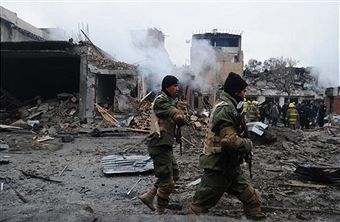 Every war takes its time to produce a good film or even a piece of journalistic analysis that goes beyond running commentary. Apocalypse Now came years after the end of the Vietnam War and it took seven years before this year’s Oscar winner, The Hurt Locker, could be produced.
Every war takes its time to produce a good film or even a piece of journalistic analysis that goes beyond running commentary. Apocalypse Now came years after the end of the Vietnam War and it took seven years before this year’s Oscar winner, The Hurt Locker, could be produced.
The newspapers are full of excellent reporting from Kabul, with The Times Anthony Loyd, The Guardian’s Jon Boone and the NYT’s Dexter Filkens matching anything that came out of the Saigon. But sit-back-and-think-hard reporting has been rare.
Nine years after the ousting of the Taliban, author Robert D. Kaplan’s piece “Man versus Afghanistan” in the April issue of The Atlantic is the exception. Superbly-written, mixing ground-truth and ethics, the piece should be read by anyone interested in NATO’s Afghan war and the future of expeditionary warfare.
A choice passage looks at the limits of human agency and casts NATO commander Stanley McChrystal as some kind of uniformed Nietzsctean Ubermensch:
‘Stanley McChrystal’s job is to serve as the deus ex machina for the rebirth of that modestly well-functioning mid-20th-century Afghan state, and for Afghanistan’s fade-out from the front pages — the definition of victory in our imperfect world.
McChrystal, the hybrid product of the übermacho Rangers and Special Forces subcultures within the U.S. Army, is now the philosopher’s weapon against those vast impersonal forces of history and geography, and, I might add, the agent of deliverance from our post-9/11 mistakes in Afghanistan.’ Great reporting from a master story-teller whose writings are, as in the case of his 1990s book “Balkan Ghosts”, not always right but always good.






Comments